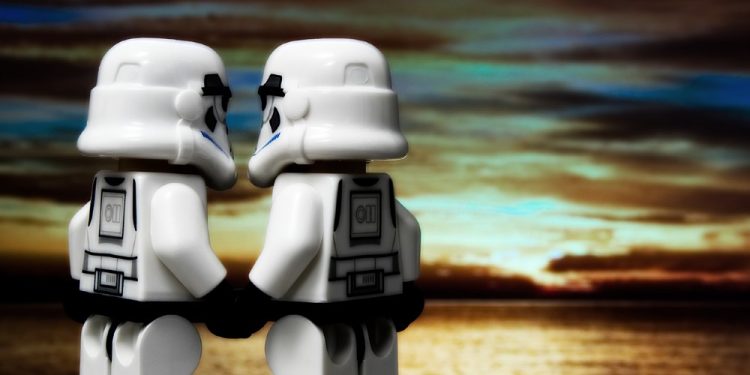The consortium of systems that make the United States function – everything from transportation to mail service to food distribution – are falling apart with increasing speed the more society goes “woke.”
System failures that in times past would have been unheard of, or at least exceptionally rare, are fast becoming the norm as unqualified people are elevated to positions of power and influence in the name of “equity” and “reparations.”
It no longer matters if a person possesses certain skills or know-how if he has the “wrong” color skin or is not a member of the LGBT “rainbow.” A straight, white genius can now be passed over in favor a transgender, black “diversity” candidate – and nobody bats an eye.
The long-term consequences of such discrimination are many. In the span of less than six months back in 2017, there were three U.S. Naval warships that experienced three separate collisions resulting in 17 deaths. A year later, there was a wildfire that started because of mismanaged power transmission lines owned by PG&E.
Then we have the recent East Palestine train derailment, which created what many say is the largest dioxin plume in world history, followed by an air traffic control error that resulted in the clearing of a FedEx plane landing on a runway that was occupied by a Southwest plane preparing to take off – oops.
(Related: Check out what The North Face did to promote “pride” this year.)
Is it possible for America to reverse course or is it already too late?
Because of the interconnected nature of American society and its many complex systems, all it takes to create a major disruption is for one piece to fall out of place, creating a cascade of other failures.
The more “woke” America becomes, the worse these systems seem to get. Suddenly there are a whole lot more accidents, a whole lot less reliable mail carriers, and the constant threat of another major disaster occurring out of nowhere.
“The core issue is that changing political mores have established the systematic promotion of the unqualified and sidelining of the competent,” writes Harold Robertson for Palladium magazine.
“This has continually weakened our society’s ability to manage modern systems. At its inception, it represented a break from the trend of the 1920s to the 1960s, when the direct meritocratic evaluation of competence became the norm across vast swaths of American society.”
In its heyday, the United States seemed to have mastered the art of selecting candidates that were qualified and able, regardless of their wealth, class, or political connections. Today, it is all about having dark skin, or using gender pronouns, or hating Christians that gets a person hired.
How long can a civilization persist with such practices in place before it collapses? Today’s America is giving us hints that it will not be long before the country reaches its inevitable end, assuming it fails to reverse course.
“In the language of a systems theorist, by decreasing the competency of the actors within the system, formerly stable systems have begun to experience normal accidents at a rate that is faster than the system can adapt,” Robertson adds.
“The prognosis is harsh but clear: either selection for competence will return or America will experience devolution to more primitive forms of civilization and loss of geopolitical power.”
The decline of merit-based positioning in society did not happen overnight. It surely accelerated with great speed in recent years, but the process has been ongoing since at least the 1960s when the cultural revolution really ramped up the process of degradation.
“The path of least resistance will be the devolution of complex systems and the reduction in the quality of life that entails,” Robertson warns.
If all of America goes woke, the entire country will certainly go broke. Learn more at Wokies.news.
Sources for this article include:
- Preserve your retirement with physical precious metals. Receive your free gold guide from Genesis Precious Metals to learn how.
What Would You Do If Pharmacies Couldn’t Provide You With Crucial Medications or Antibiotics?
The medication supply chain from China and India is more fragile than ever since Covid. The US is not equipped to handle our pharmaceutical needs. We’ve already seen shortages with antibiotics and other medications in recent months and pharmaceutical challenges are becoming more frequent today.
Our partners at Jase Medical offer a simple solution for Americans to be prepared in case things go south. Their “Jase Case” gives Americans emergency antibiotics they can store away while their “Jase Daily” offers a wide array of prescription drugs to treat the ailments most common to Americans.
They do this through a process that embraces medical freedom. Their secure online form allows board-certified physicians to prescribe the needed drugs. They are then delivered directly to the customer from their pharmacy network. The physicians are available to answer treatment related questions.





“The decline of merit-based positioning in society did not happen overnight. It surely accelerated with great speed in recent years, but the process has been ongoing since at least the 1960s . . .”
EXACTLY SO!!!
Since after the Coup of 1963, with LBJ flipping all of President Kennedy’s programs and actions —- with Nixon/Kissinger/Rockefeller teamimg up with Mao/Zhou Enlai later —- exactly so!!!
An interview with CIA asset, Tom Braden, and evolving globalist Pat Buchanan and Rep. Larry McDonald (who, along with Gen. Singlaub, founded the American chapter of the World Anti–Communist League), most revealing:
https://youtu.be/OJBh7tOBkpk